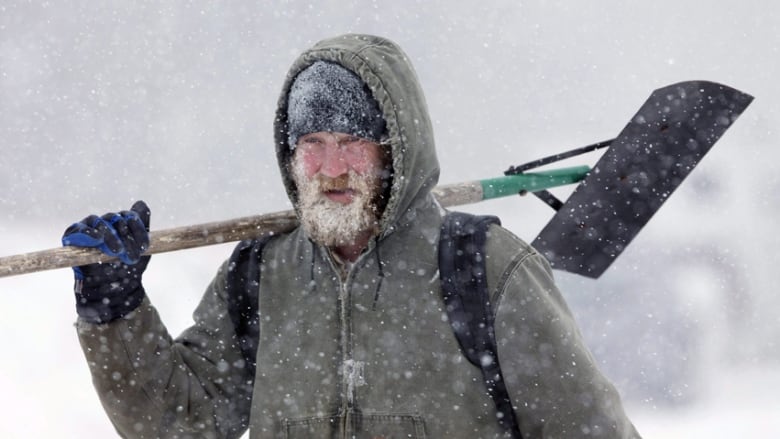Cold deemed deadlier than heat when it comes to weather deaths
Researchers say nearly 4.5 per cent of deaths in Canada over study period were due to cold

Cold temperatureskillabout 20 times as many people worldwide as hot temperatures do, say Canadian and international researchers who challenge conventional wisdom that extreme weather events cause the most deaths.
In a study published Wednesday in the medical journal The Lancet, researchers analyzed data on 74 million deaths across countries with climates ranging from cold to subtropical between 1985 and 2012.
After examining temperature, humidity and air pollution measurements, the team used a statistical model to estimate how a specific temperature contributes to mortality risk during the following days. The team then calculated how many deaths on foul-weather days exceeded what occurred during optimaltemperatures for each location.
"This study indicates that cold kills 20 times as many people as hot weather, with 7.3 per cent and 0.4 per cent of the number of deaths thatoccurred in the 13 countries within the study period being due tocold and heat, respectively," said lead author Antonio Gasparrini from the London School of Hygiene and Tropical Medicine in the U.K.
"These results challenge the conventional wisdom that the health effects of temperature are limited to extreme weather events," he added in an email interview.
Overall, about 90 per cent of the deaths attributed to cold occurred on mildly cold days. Extreme temperatures accounted for less than one per cent.
The Canadian findings showed nearly 4.5 per cent of deaths in this country over the study period were due to cold compared with 0.5 per cent for heat.
Most of the deaths in Canada were during mild hot or cold days, while the contribution of days with extreme temperature is relatively smaller, said study co-author Eric Lavigne, a professor at the Interdisciplinary School of Health Sciences at the University of Ottawa.
"Given much attention has been emphasized on heat-related impacts, public health policies that focus on the prevention of temperature-related health effects should ensure that appropriate measures are undertaken to prevent cold-related health impacts," Lavigne said.
There were substantial differences between countries. Deaths attributed to non-optimal temperatures ranged from 3.37 per cent in Thailand to five per cent in Canada and 11 per cent in China.
The other countries included were Australia, Brazil, Italy, Japan, South Korea, Spain, Sweden, Taiwan, Thailand, U.K. and U.S.
One of the limitations of the research is that factors such as age, socioeconomic status and some air pollutants weren't included.
Keith Dear andZhanWang from DukeKunshanUniversity inJiangsu, China, wrote ajournal commentary published with the study.
Although deaths attributed to cold are substantially more common, they attract far less public attention than heat waves, the commentators said.
Since high or low temperatures affect susceptible groups such as the unwell, young and elderly the most, they suggested attempts to mitigate the risk associated with temperature would benefit from in-depth studies of the interaction betweenmortality and socioeconomic factors.
Gasparrinisaid it is hoped the study will contribute to how policies can be designed to prevent deaths attributed to different temperatures.
Researchers plan to expand the data set to include more regions of the world.
The study was funded by the U.K. Medical Research Council.
With files from CBC's Amina Zafar












_(720p).jpg)


 OFFICIAL HD MUSIC VIDEO.jpg)
.jpg)



























































































